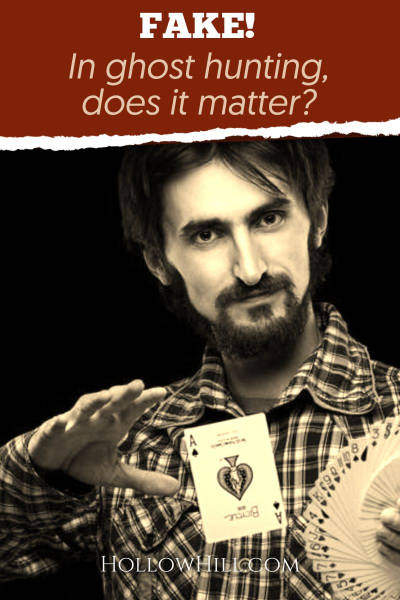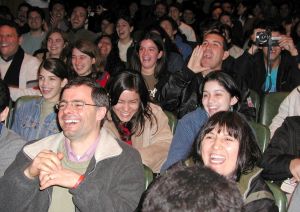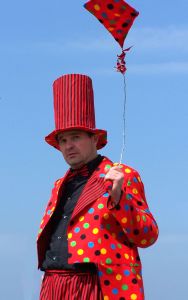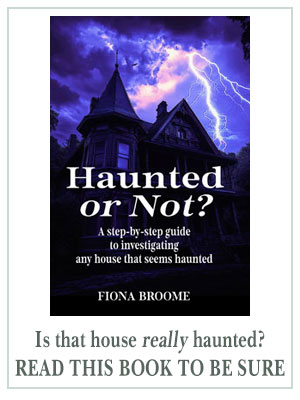As an Amazon Associate I earn from qualifying purchases. Click for details.
Integrity is a researcher’s most valued asset. In paranormal research, it’s especially important. However, since entertainment has become part of the paranormal scene, the lines have blurred between reality and showmanship.
 “Fake!”
“Fake!”
I hear that accusation far too often, and usually about the wrong people.
It’s true that there are fakes, frauds, and con men (and women) working in ghost-related professions.
More are sincere researchers, looking for answers to questions that have been around for centuries.
It’s important to know the difference.
Or, depending on your goals and interests, maybe it doesn’t matter.
What are your goals?
Entertainment
 Many people enjoy ghost-related TV shows, ghost tours, dinner and stage presentations, and ghost-themed events.
Many people enjoy ghost-related TV shows, ghost tours, dinner and stage presentations, and ghost-themed events.
If you’re looking for entertainment, keep your focus on the fun. Don’t worry how much of it is real or just a clever presentation.
In real life, ghost hunting is tedious. The one-hour show you see on TV may have taken two to five days to film. You’re seeing only the interesting moments.
If you’re at an event and just one or two people keep you entertained for an entire evening, as if it’s a show… maybe it is.
But, if you’re only there for the fun and an occasional “good scare,” does it really matter how much of it is real?
Disney’s Haunted Mansion attraction isn’t “real.” However, many ghost enthusiasts – including me – wait in line for an hour or longer to enter that attraction, because it’s great entertainment.
If you’re at an event or watching a show to be entertained, judge it by the fun, period.
You Have a Question
Many people have questions about ghosts.
- You may want to know if there really is something after death.
- You may have had a ghostly encounter, and want to know if it was real.
- You may suspect that you’re psychic, but you’re not sure.
- Or, a movie or TV show scared you, and you want to know if that kind of phenomena is real.
 If that’s what draws you to paranormal research, get involved with a good research group, or start one yourself.
If that’s what draws you to paranormal research, get involved with a good research group, or start one yourself.
Some TV shows*, stage presentations, and events lean towards “entertainment.” In other words, they may be faking some or all of what you see.
Unfortunately, people who want to believe in an afterlife can be among the most gullible.
If you’re looking for answers to spiritual questions, keep these two points in mind:
1. You may never find absolute proof of an afterlife or ghosts. “Clear evidence” for one person may seem ridiculous to someone else. Only you can decide if you’ve found answers you seek.
2. Many seekers are vulnerable. Become a skeptic. Don’t confuse performers with genuine researchers. Learn to tell them apart.
After you find an answer to your questions – or decide that there is no answer – you may lose interest in paranormal studies.
It’s okay to walk away from ghost hunting if (and when) it stops being interesting. Don’t keep watching TV shows, paying for events, or going on investigations if they’re disappointing you.
If asked, say, “I found the answer that I was looking for. It’s personal.”
And then, change the subject.
Or, once you feel as if you found what you’re looking for, you may be more interested in paranormal research.
You’re with a Friend and…
Sometimes, people join a friend (or friends) at a ghost tour or a ghost investigation. Soon, they’re involved in paranormal research, too.
Or, they go to an entertainment-style event, find it intriguing, and become a fan.
Remember why you’re there, and – before taking anything seriously – use your critical thinking skills. Get educated. Listen to believers and skeptics alike. Both provide important advice.
Power, Fame, and Money
 When any subject is featured on several TV shows, some people get involved for fame and fortune.
When any subject is featured on several TV shows, some people get involved for fame and fortune.
There’s nothing wrong with that, as long as everyone’s reasonably honest about it.
Most theatrical ghost tours and Halloween “haunted houses” are clearly fake.
As long as you remember it’s just a show, there’s nothing wrong with enjoying it.
Now and then, an entertainer will mix reality and performance. More than one genuine psychic has been tripped up that way, feeling obliged to put on a show when nothing was actually going on.
Would you be happier spending $150 for a ghost hunt in which nothing happened all evening… or if a few people exaggerated their experiences, to give attendees a chill?
My advice for fans: Treat ghost hunting like any other form of entertainment. Some shows will be more authentic and more fun than others. Decide your goals – and your spending limit – ahead of time.
Entertainer or Researcher… or Both?
 Among ghost hunters, psychics, and paranormal “experts,” some people are entertainers. They can be tremendous fun, on- and off-stage.
Among ghost hunters, psychics, and paranormal “experts,” some people are entertainers. They can be tremendous fun, on- and off-stage.
Some tell wonderful stories. They may also be moderately psychic… or good at convincing you that they are.
Enjoy that for what it is: Great fun.
Others are serious researchers. I’m one of them.
Frankly, we can be geeky, boring people.
However, if you can keep from nodding off when we talk about our latest projects, you may glean some useful insights for your own research.
People like me were paranormal researchers long before TV shows made ghost hunting popular**. We’ll be here long after the fad is eclipsed by the next popular trend, too.
If you’re attending an event, listening to the radio or watching TV, ask yourself:
- Is this person an entertaining speaker presenting reliable information?
- Is this improving your understanding of ghosts and ghost hunting?
- Or, is he (or she) putting on a show? If so, is it entertaining?
Houdini wasn’t a “fake.” He was a performer.
The same can be said for modern-day stage magicians. The fun (and the challenge) is figuring out how he or she makes it seem real.
The excruciatingly boring speaker at a conference probably isn’t “fake.” He or she is sharing research results. If you thrill to news about scientific breakthroughs, the fun is examining the evidence to see if it’s helpful. The learning curve… maybe not so much fun.
In general, if you know what your goals are, use them to judge the merits of the TV show, event, investigation or personality.
Fake? That’s an issue if you’re looking for answers and a genuine encounter with the paranormal world.
A better question is whether you’re disappointed, and if the show, event or person is worth your time.
![]()
If you’re concerned that someone is a fraud, see my article, Scams and Con Artists.
*For many years, I defended Jason Hawes’ and Grant Wilson’s work on the Ghost Hunters TV show.
Today… I don’t know if they were set up, if they knew, and how much their contracts prevented them from admitting to it.
Editing can dramatically change how something looks.
** This website – first as Yankee Haunts and then Hollow Hill – has been online since the mid-1990s.
In other words, I can prove how long I’ve been professional in this field. My integrity – and legacy – are important to me. My articles are completely honest, though I try to be tactful, especially when talking about friends in this field.
But frankly, I’m terrible at lying.


Call me sick of the professional skeptics, who deny the validity of paranormal research, but I don’t like the phrase “become a skeptic.” It suggests being skeptical is superior to being a believer, which is not what I think you meant. I prefer “become streetwise to put-ons,” which suggests there is reality, and there is illusion, and it’s a matter of being able to distinguish between the two. Good article!
Michael, thanks for your comment. You’re right about the skeptics, and you’re right about it not being as precise a term as I’d like, for the attitude people should probably take.
Recently, I listened to a so-called believer (and supposed expert) claim that almost all orbs are fake and he’d only photographed one good one, ever. That was fine, until he followed it up by saying, “And, if I’d enlarged that photo with Photoshop, I’m sure I’d have seen a moth in it.”
I was stunned. I mean, how can a serious researcher make broad claims like that, without analyzing his or her own photos? To me, that’s as bad as assuming that all orbs are ghosts.
Somewhere in the middle, there’s healthy skepticism with both the cognitive skills and expertise to analyze our experiences and say with reasonable authority whether something seems paranormal or not.
In lieu of that, having heard of a few people losing money to paranormal scams, I’d rather have them lean towards skepticism than gullibility. I’d rather have someone assume that it’s all a show, rather than lose all faith in the spiritual world after being misled by an entertainer.